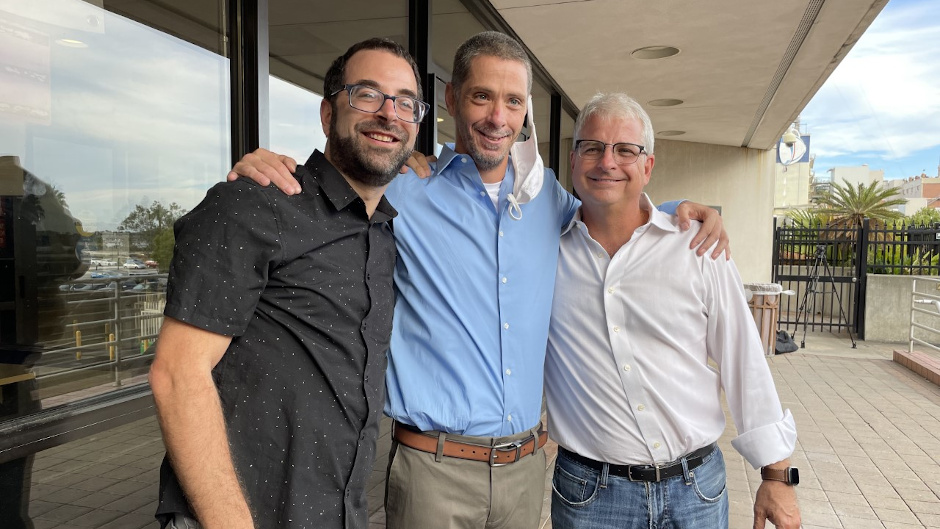Miami Law's Innocence Clinic won a stunning victory today for client Dustin Duty, securing his release from prison. The now 36-year-old was wrongfully convicted of a 2013 armed robbery in Jacksonville and sentenced to 20 years in prison for a crime he did not commit.
“After five years of strenuous litigation, this victory finally secures Mr. Duty’s long-overdue release,” said Craig Trocino, the clinic's director. "While we can’t give him the last eight years of his life back, we are honored to have secured his freedom and cleared his name."
The Innocence Clinic took on his case in 2016 after Duty wrote letters to the clinic begging to help him prove his innocence. At least 18 students worked on Duty’s case over the past five years; the clinic represented him jointly with the Innocence Project of Florida.
Duty's exoneration comes three months after Florida's 1st District Court of Appeal declared his conviction unconstitutional. The appellate court reversed Duty's conviction on July 15, 2021, agreeing unanimously and emphatically that he received ineffective assistance of counsel in violation of his Sixth and 14th Amendment rights. More than three months later, the State Attorney’s Office for the Fourth Judicial Circuit dropped the armed robbery charge.
“We are thankful that the State understood the impact of the appellate court’s opinion and realized the only just decision was to not retry a case with no evidence pointing toward Dustin Duty’s guilt and with only significant evidence of his innocence remaining,” said IPF’s Executive Director, Seth Miller. “We look forward to walking Dustin out of the jail and helping him as he reintegrates back into free society.”
Duty's conviction hinged on one single piece of evidence: a highly suggestive identification made by the victim. Instead of placing Duty in a line-up, police officers brought the victim to his location, told the victim they found someone matching the description of the suspect she provided, and clothed Duty to resemble better her provided description of the suspect. However, Duty was not dressed like the perpetrator when police stopped him, and he was wearing distinct items of clothing that would have been noticeable had he been the attacker — a toolbelt, a backpack, and duct-taped shoes.
Even more egregious, the Jacksonville man had an alibi. His boss at his recently-obtained roofing job said he dropped off Duty in the area after the robbery had already occurred. In the interrogation room, Duty begged the lead detective on the case to call his boss. But the police failed to follow up. Before his trial, Duty begged his trial lawyer to call his boss to testify. The lawyer also failed. Accordingly, the jurors never heard Duty's alibi, and when deliberating, the jury asked: "The victim stated her assailant was dressed as a construction worker. Was the defendant employed, and did he have an alibi for the time involved?" According to the trial transcript, Duty's trial lawyer replied that "there wasn't any evidence presented on that topic."
The clinic filed its first post-conviction motion in 2017, asserting that Duty received ineffective assistance of counsel because his trial attorney failed to call a key alibi witness, impeach the lead detective on the case, or challenge the impermissibly suggestive identification procedure. The trial court incorrectly denied the motion, and the clinic appealed to the 1st District Court of Appeal.
The appellate court sided with the clinic on all counts. With regards to the alibi testimony, the court determined: "Had this testimony been presented to the jury, a reasonable probability exists that the outcome at trial would likely have been different such that confidence in the outcome is undermined."
The court also agreed that trial counsel was ineffective for failing to impeach the detective and for failing to challenge the "unduly and unnecessarily" suggestive show-up identification. Those errors, individually and cumulatively, ensured Duty "did not receive the representation guaranteed him by the constitution, calling into question his conviction."
“The Innocence Clinic offers a unique learning experience for students while strenuously fighting for the wrongfully convicted,” said Interim Dean and Visiting Professor Nell Jessup Newton. "While the students benefit from this experience in immeasurable ways, no one benefited more than Dustin Duty, who is a free man today because of the Innocence Clinic’s work and dedication.”
The Miami Law Innocence Clinic and the Innocence Project of Florida are dedicated to finding innocent people in Florida's prisons and freeing them using new evidence of actual innocence.
The Miami Law Innocence Clinic is a pro bono legal clinic at the University Miami School of Law. The clinic trains law students on the fundamentals of litigation through cases of actual innocence. Since 2012 more than 150 students have benefited from the unique educational atmosphere of the Innocence Clinic, 18 of which worked on Duty's case over the last five years.
The Innocence Project of Florida is a 501(c)(3) justice organization. Since 2003, IPF has freed 28 individuals from wrongful incarceration who collectively spent more than 588 years in prison for crimes they did not commit.
“The students who worked on Mr. Duty’s case became dedicated advocates for his freedom,” said Trocino. “The thousands of hours of work spent on his case will allow him to celebrate his 37th birthday as a free man.”

